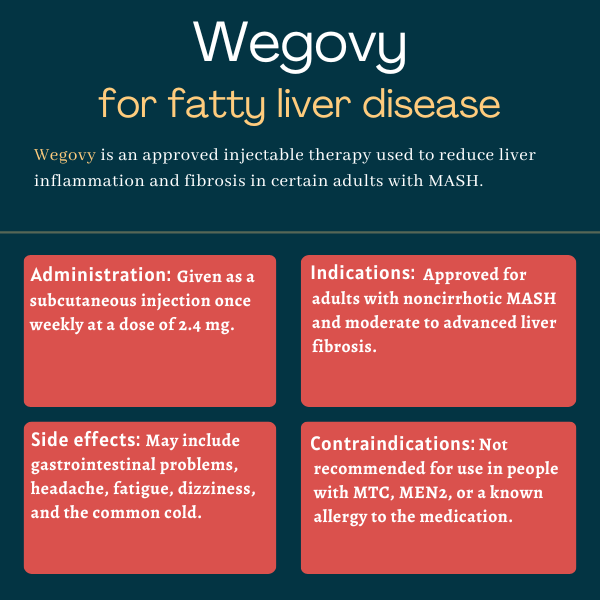
Wegovy (semaglutide) for fatty liver disease
Last updated Aug. 28, 2025, by Marisa Wexler, PhD

What is Wegovy for fatty liver disease?
Wegovy (semaglutide) is an injectable therapy conditionally approved in the U.S. for adults with metabolic dysfunction-associated steatohepatitis (MASH), a serious form of fatty liver disease.
Administered via under-the-skin, or subcutaneous, injection, the therapy has been shown to reduce liver inflammation and scarring, known as fibrosis, in people with MASH and moderate to advanced liver fibrosis, but no cirrhosis, or irreversible liver fibrosis.
MASH is driven by fat accumulation in the liver, which is closely associated with metabolic conditions like obesity, high blood pressure, and type 2 diabetes. Wegovy works by mimicking the activity of glucagon-like peptide-1, a signaling molecule that helps regulate appetite and blood pressure. As such, the therapy is expected to help reduce liver damage and prevent further liver fibrosis.
Conditional, or accelerated, approval allows a therapy to be marketed based on early signs of likely benefits in clinical trials. Wegovy’s full approval for this indication is dependent on additional clinical trial data confirming its safety and efficacy.
The treatment — the second to be approved in the U.S. for MASH, and the first and only therapy of the GLP-1 receptor agonist class to be cleared for this indication — is sold by Novo Nordisk.
Wegovy is also approved to help reduce the risk of major cardiovascular events in people with known heart disease and who are overweight or obese. It’s also indicated for use in helping reduce excess body weight in people ages 12 and older with obesity, and in certain overweight adults.
Therapy snapshot
| Brand name: | Wegovy |
| Chemical name: | Semaglutide |
| Usage: | Used to reduce liver inflammation and fibrosis in adults with noncirrhotic MASH and moderate to advanced liver fibrosis |
| Administration: | Subcutaneous injection |
Who with fatty liver disease can take Wegovy?
Wegovy is approved in the U.S. for adults with MASH and moderate to advanced liver fibrosis, but no cirrhosis. It is specifically cleared for use in combination with increased physical activity and a reduced-calorie diet.
The therapy’s prescribing information has a boxed warning for the risk of thyroid C-cell tumors, such as medullary thyroid carcinoma (MTC). Wegovy is not recommended for use by anyone with:
- a personal or family history of MTC
- multiple endocrine neoplasia syndrome type 2 (MEN2), a rare condition that causes tumors in certain glands, including the thyroid
- a history of allergic reaction to the medication or any of its ingredients
- severe gastroparesis, a chronic condition characterized by delayed stomach emptying
How is Wegovy administered in fatty liver disease?
Wegovy is given by subcutaneous injection. Available in a prefilled, single-dose pen, the therapy can be self-administered with appropriate training.
The recommended dosage of Wegovy for MASH is 2.4 mg once weekly. Patients start at lower doses and gradually increase up to this target dose; lower doses may be given long-term if the target dose is not tolerated.

Wegovy in fatty liver disease clinical trials
Wegovy’s conditional approval for MASH in the U.S. was based on data from the first part of an ongoing Phase 3 clinical trial called ESSENCE (NCT04822181). The analysis covered 800 people with MASH and moderate-to-advanced fibrosis who were given either Wegovy (2.4 mg) or a placebo for about 1.5 years. Data showed that, relative to the placebo, participants given Wegovy were significantly more likely to see beneficial effects. Specifically, these were:
- a reduction in liver inflammation without fibrosis worsening (62.9 % vs. 34.3%)
- a lessening in liver fibrosis without worsening of liver inflammation (36.8% vs. 22.4%)
- a reduction in both liver fibrosis and inflammation (32.7% vs. 16.1%).
The second part of the ESSENCE study is testing whether Wegovy significantly alters the risk of liver-related clinical events, including cirrhosis, relative to the placebo, after about 4.5 years of follow-up. This part of the study is expected to wrap up in 2029.
Wegovy side effects in fatty liver disease
The most common side effects of Wegovy in people with MASH include:
- nausea
- diarrhea
- vomiting
- constipation
- abdominal pain or swelling
- headache
- fatigue
- indigestion
- dizziness
- belching
- flatulence
- inflammation of the stomach and intestines
- the common cold
Some people with MASH taking Wegovy also experienced gastroesophageal reflux disease, a condition marked by acid reflux from the stomach into the gullet and subsequent heartburn. A number of MASH patients with type 2 diabetes had low blood sugar levels with use of the therapy.
Wegovy may also cause other safety issues that may require monitoring and/or adjustments in treatment. These reactions may include:
- severe gastrointestinal issues
- pancreas inflammation
- gallbladder disease
- kidney damage
- allergic reactions
- increased heart rate
- eye complications in people with diabetes
- suicidal thoughts and behaviors
- food or liquid entering the lungs when under general anesthesia or deep sedation
Animal studies have indicated that the use of Wegovy during pregnancy may affect a developing fetus, and that the therapy is excreted in breast milk. The impact of Wegovy in people who are pregnant or breastfeeding is not known; a registry is collecting data on people exposed to Wegovy while pregnant.
Liver Disease News is strictly a news and information website about the disease. It does not provide medical advice, diagnosis, or treatment. This content is not intended to be a substitute for professional medical advice, diagnosis, or treatment. Always seek the advice of your physician or other qualified health provider with any questions you may have regarding a medical condition. Never disregard professional medical advice or delay in seeking it because of something you have read on this website.
Recent Posts
- Skipping PBC treatment leads to longer hospital stays, higher costs: Study
- Distinguishing between PFIC3, Wilson’s disease key for optimal outcomes
- The different ways fatty liver disease affects women vs. men
- Who would’ve guessed a child growth chart would be my nemesis
- New blood test helps spot hidden liver scarring earlier




